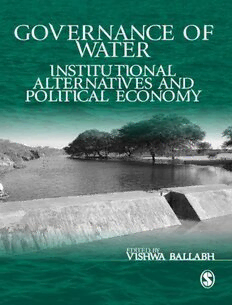
Governance of Water: Institutional Alternatives and Political Economy PDF
401 Pages·2008·1.413 MB·English
Most books are stored in the elastic cloud where traffic is expensive. For this reason, we have a limit on daily download.
Preview Governance of Water: Institutional Alternatives and Political Economy
Description:
Water related issues impinge on human well being in a variety of ways and preservation of water sources is essential for the development of a healthy society. The ground reality, however, is very different and there exists competition among and between different water users and use sectors that results in conflict. Improving governance of water is a paramount need for society, but existing reform efforts and policy initiatives have made little headway. This book makes an effort to initiate the discourse of governance of water in the Indian context from a variety of angles, such as neo-classical and institutional economics, deliberative democracy, public administration, collective action and political economy perspectives. Reform in water governance not only includes a re-orientation of policy priorities and approaches, but also the restructuring of the institutional framework away from the state and village dichotomy. New intermediate institutions are required to allow a negotiated approach to water resource governance, multi-stakeholder participation, and integrated water resource management at various levels: the village, state, and nation as a whole.
See more
The list of books you might like
Most books are stored in the elastic cloud where traffic is expensive. For this reason, we have a limit on daily download.
